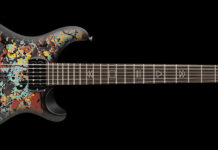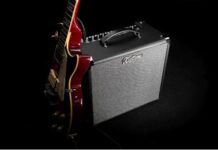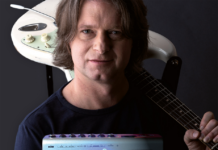![gw_0318_026-1[1]](https://www.promusic.news/wp-content/uploads/2018/01/gw_0318_026-1[1]-153x200.jpg)
Ty Tabor Talks Tone, 'Alien Beans' and a New King's X Album
Guilford Guitars Ty Tabor 2.0 model
What is the hardest song to play live? That goes for King’s X or any of your other projects. —Christopher Goodwin
Well, a lot of the songs I’ve never played live, so I don’t know. There’s a whole lot of music on my solo stuff that I don’t even know if I can play it live. As far as King’s X is concerned, believe it or not, “It’s Love,” one of our biggest hits in the early days [1990], is one of the most difficult songs for us as a band to play. It just requires more coordination than most songs, as far as voice and hand coordination, doing things at different rhythms and times that don’t hit at the same time together. It gets confusing. So that’s a hard one for us to pull off and do it well.
I’m excited to hear your new solo album, Alien Beans. What can you tell me about it? —Dutch Schultz
It was an idea that started with my manager—to release a bunch of the stuff I had released to fans online, things that weren’t on a major label. He suggested I should release some of the catalog on a label so that more people would know about it. That was the original idea—but as we were putting some of the old stuff together, I also was writing new stuff, so I told Rat Pak Records, why don’t I write some more new songs and we can make it a bigger package, offering more than just the old stuff. The intention was to have two or three new songs, but as I kept writing I kept putting it on hold, saying I’ve got another one that’s almost finished and another one that’s almost finished, etc. I basically put the album on hold for about a year to finish writing songs to have a new album to release at the same time with the old. So we decided to make it a double album—old and new.
Is there a young guitarist or band that excites you? —Chris Healey
Death Cab for Cutie. I’ve been a big fan of theirs for years. Chris Walla, the guitarist that left the band after their last album [2015’s Kintsugi], he’s someone I always enjoyed watching play live and enjoyed what he does live. He’s just very atmospheric and different and quirky, but I loved everything he did and what he added to the band. And for a while I was into Billy Talent pretty heavily, but I haven’t listened to them a lot lately. I’ve actually been going back and listening to a bunch of stuff from the Seventies that I haven’t heard in a long time. I’ve been doing more of that than getting into new stuff. But any time Death Cab has something new out, I get it as soon as it’s available.
I’ve always thought your tone on [the 1994 King’s X album] Dogman was amazing. What amp and gear did you use? —Dan Coppola
I used more than one thing, actually. I had a Mesa/Boogie Dual Rectifier that was real hot, and I also had a Marshall that belonged to [producer] Brendan O’Brien. It was basically a combination of the Dual Rectifier and the Marshall on a lot of things. As far as guitars, I think I was playing a Zion during that time and Strats also. So, kind of a combination.
King’s X’s sound changes so much on each album, from the reverb future of Out of the Silent Planet to the tremendous heaviness of Dogman to the warm tones on Ogre Tones. Which album do you think best sonically represents the band’s sound? —Fitch Proctor
Probably Gretchen Goes to Nebraska [1989]. There are others where I like the guitar sounds, but with Gretchen, somehow we had the mics placed perfectly. By the way, the way we got these guitar tones was by using very cheap [Shure] SM57 mics. Every time someone tries to use something expensive on one of my cabinets, I hate the way it sounds. I can’t tell you how many engineers I’ve had to argue with and say, “Just put a 57 by the cone and let me show you where to put it.” They would just be flabbergasted and say no way. There’s a special technique to using a 57 to get a killer guitar sound; it usually involves aiming more toward the outer part of the cone of the speaker instead of the inner cone. Most people point toward the inner cone. I hate that sound. The outer cone gives it a quirky, weird tone.
You pioneered the drop-D sound in rock. A quick listen to “Pleiades” [from Gretchen Goes to Nebraska] and it’s clear that no one was using drop tunings like you. What inspired you to experiment with drop tunings? —Wendell Lowder
The very first thing that inspired me to tune a guitar down was “I Want You (She’s So Heavy)” by the Beatles. When it gets to the end of the song, that big riff, you can’t play those notes in regular tuning. I was figuring it out and I was like, my guitar doesn’t go low enough. So I just tuned the strings down to hit the note. That was my first time doing a drop tuning—what was that, 1969? After that I started realizing that a lot of blues players were doing it on acoustic, and then I heard Brian May do it on a song or two and Eddie Van Halen did it on Fair Warning, but mainly Brian May on Queen’s “Fat Bottom Girls.” That drop tuning seemed heavy. I had already started experimenting, but when I heard that, I said, yeah, that’s a pretty evil sound. I started writing things around that.
How do you get your tone? Better yet, how do I get your tone? What guitar, what amp, etc. should I get? Is there a “Ty Tabor kit” I could assemble? —Lance Daltrey
I wouldn’t recommend anything because people would buy something and say, “This doesn’t sound anything like Ty Tabor.” That’s just the truth. It doesn’t matter if I’m using Orange amps or Boogies or Labs or Marshalls or what. People tell me my tone doesn’t vary a whole lot depending on the amp I’m using, or the guitar. In general, the tone stays in the ballpark. Believe it or not, that’s always been a problem for me because my tone is, well, I’ll just say it the way [King’s X members] Doug [Pinnick] and Jerry [Gaskill] always say it: No matter what I pick up, it doesn’t sound like anybody else. Every time, Doug will shake his head and say, “It’s in the hands.” Brian May can pick up whatever it is, and it’s gonna sound like Brian May because it’s in his hands. It’s not the gear. There’s no easy answer. Just plug into something and be that. I wish there was, because I’ve spent my whole life trying to get other people’s tones, but it just doesn’t work that way.
What’s your all-time favorite song that you wrote and why? —Todd Teske
Probably “Ride” [from Tabor’s 2006 solo album Rock Garden] because it’s about motocross and racing, and those things are a much bigger part of my life than people realize and always have been. I’ve told people a million times: If I could’ve made a living in motocross, no one ever would’ve heard me play a note of guitar. It was my true, true love and passion. I’m still drawn to it, and I ache that I’m not physically strong enough to take that kind of abuse and do it anymore. I’ve broken too many bones, and now I’m paying the consequences of a life of racing. There’s no high I’ve ever felt in front of a crowd that can compare to the high of being in the middle of a race. The adrenaline, the focus, everything is so much higher because danger is involved. A mistake means bad things for you and others. Your focus reaches a place that fear puts you in that you can’t get to in normal life. That gives you a high like nothing I could explain. I used to tell people it was spiritual. I played in front of over 300,000 people at Woodstock [1994], and that feeling was lame compared to the feeling of being in a race. That’s the honest-to-god truth. The ultimate to me is being in a motocross race and flying through the air. I used to love, love, love flying through the air. I got into it to do jumps!
What was your first guitar and where did you get it? —Jade Mitchell
It was a little plastic guitar my parents bought for me. I was really young, like, three maybe. It was for my birthday, I believe. So they gave me this guitar and I knew it wasn’t real. It was a plastic acoustic guitar, and it didn’t sound right and I just got really mad about it and I went to the living room, put it on the floor and jumped up and down on it and smashed it into little pieces. I was just angry that it didn’t sound right! I mean, I was so excited—I got a guitar, but no, it’s not a guitar! But, instead of being very angry with me, my parents bought me a real guitar. They realized I could tell the difference—and that I wasn’t just a kid saying, “I want this, I want this,” but that I really understood it. I know my first electric was definitely a Telstar. There was a kid down the street with a Telstar and a little amp that had a three-inch speaker in it. He sold it to me—the guitar and the amp—for $25. I mowed yards for six weeks to be able to pay for it. My dad bought it and I mowed to pay him back.
Who are your top three guitarists of all time based on a combination of technical virtuosity, signature sound and influence on the world of music? —Jeff Tiongson
That’s tough. I don’t know if I could do just three, but I’ve got six! Brian May—ultimate style, tone, taste, choosing what to play and what not to play, it’s genius. He’s one of the most gifted guitarists we’ve ever had. The same goes for Allan Holdsworth. He literally changed my life. He changed everything for me—my view of how to play got shattered when I heard the first U.K. album he was on [1978’s U.K.]. The solo on “In the Dead of Night,” I was shocked. I was like, “What is this?” To me he was a god among men. Ace Frehley of Kiss because of his choice of notes—he had some of the greatest solos I’ve ever heard. Like on “Shock Me,” to me there couldn’t be a more perfect solo for that song. Robin Trower had a big influence for obvious reasons, that bluesy style, that touch. I saw him recently; it was one of the best shows I’ve seen in years. Number five is Johnny Winter, another life changer. When I heard him play blues on 12, it gave me permission, and it was life changing. Number six is Phil Keaggy. He’s one of the greatest players I’ve ever seen live. I’ve seen him countless times and I’m always inspired. It always makes me want to practice. The first few times I saw him, it made me want to quit.
When is King’s X going to record a new album? —Paul Walker
We’re looking at the beginning—some of the demoing and recording—of a new album this year, actually. We’ve been talking about it for a couple of years, and the plan is, if everything falls in line, to do a new album in 2018.
Source: www.guitarworld.com










